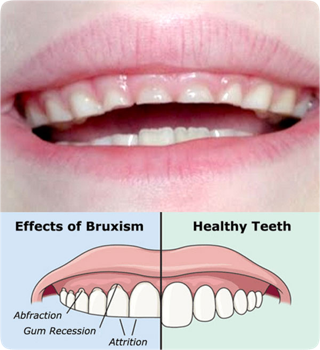Teeth Grinding
Teeth grinding (bruxism) results from involuntary clenching of jaws, which many occur at daytime or at night (sleep bruxism). Everybody grinds his or her teeth at times, and such occasional bruxism is no big problem. Things get worse when we grind hard and continuously. Severe bruxism can cause dental enamel to wear down. Your teeth may lose shape, become loose, grow sensitive, develop cavities and decay.
Constant clenching entails hard work of jaw muscles and the temporomandibular joint – the hinge, by which the jaw is attached to the skull. As a result, a patient may develop a temporomandibular disorder (TMD). This condition causes severe pain and may change your appearance.
Why do we grind teeth?
 No one can tell exactly why people develop bruxism. Studies have shown that fits of bruxism tend to occur during sleep. For this reason, many people have no idea they are having a problem. Headache after sleep can be assign of bruxism. Some people learn about it from their spouses who hear them grind teeth at night.
No one can tell exactly why people develop bruxism. Studies have shown that fits of bruxism tend to occur during sleep. For this reason, many people have no idea they are having a problem. Headache after sleep can be assign of bruxism. Some people learn about it from their spouses who hear them grind teeth at night.
There are lots of factors, which affect sleep and may cause us to grind teeth. These include:
Stress or anxiety accounts for nearly 70% of cases of bruxism. More often than not, long-lasting dissatisfaction with work entails severe persistent stress. According to some studies, workers who are not happy about their work are more likely to have the teeth grinding problem than those who are satisfied with their job positions. Men showed a much greater susceptibility to job-related stress and, consequently, bruxism, than women. Personality is another stress factor: people who are less resilient to stressful situations are more likely to develop bruxism and other stress-related problems.
People dealing with sleep issues fall under a category of potential bruxism patients. Particularly, this refers to people dealing with snoring, sleep paralysis, obstructive sleep apnea (interrupted or shallow breathing during sleep), sleep-talking, and other parasomniac conditions.
People, who have bad habits like tobacco smoking, alcohol drinking, excessive caffeine consumption and use of psychoactive chemicals are more vulnerable to stress and therefore are more likely to end up with the teeth grinding problem.
Is it possible to treat bruxism?
Treatment is difficult. Because bruxism is usually a sign of a bigger problem (chronic stress, anxiety, etc.), therapies should focus on eliminating this problem. Because treatment of chronic stress can be very time-taking, and hard teeth grinding may require an immediate solution, a qualified dentist may suggest using a mouth guard or splint. These items are readily available and are not very expensive. They can protect enamel from physical damage as long as you are dealing with the cause.
Treatment of stress may require a deeper psychological analysis. Based on results, your doctor may prescribe a cognitive behavioral therapy to change your perception of life.
You can use your strong will and make a conscious effort to stop grinding teeth. Also, you can dig deeper, pinpoint the sources of stress, and develop your individual stress management strategy. Using professional help won’t hurt! Use different relaxation techniques and take steps to improve sleep.
If you grind teeth when you are not asleep, try to control this habit and use habit-reversal techniques. Keep a record of urges to grind teeth and take effort to stop doing it. Cut down on smoking, alcohol, coffee, and other harmful substances!
